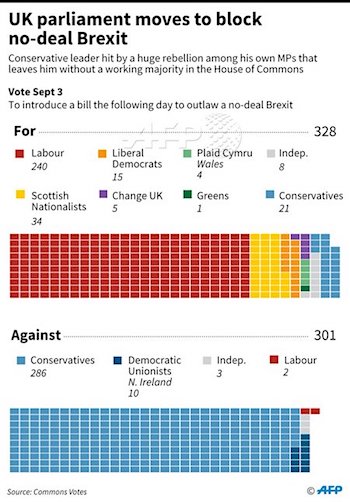
Salvador Dali Bather 1924
The US and UK are both at risk of severe legal challenges and hence “barrelling down towards great troubles” as I wrote yesterday in Twisted Pair 1 – US. The reasons are not exactly the same in both cases, but they’re close. It’s about who holds the ultimate power.
Before moving on to the UK’s specific issues, I want to share this from the BBC, one of many pieces yesterday that discuss President Trump talking to foreign leaders, and that all accuse him in one way or another of wanting to ‘dig up dirt’ about Joe Biden (something that could just as well be defined as trying to find out how Russiagate started).
This one is about Trump asking Australia for help because obviously there’s a strong connection to the country in the person of former Australia High Commissioner to the UK Alexander Downer, who claims Trump ‘aid’ George Papadopoulos told him in May 2016 that Moscow had dirt on Hillary Clinton. Papadopoulos has always denied saying it.
But it appears the world media have made it their task to vilify Trump’s efforts to investigate Russiagate, so expect much more of it. The article for instance also mentions Bill Barr talking to Italian and British intelligence. Yeah, they’re serious about wanting to find out what happened. I’d suggest you get used to that. But here’s what I want to share:
[..] while the Ukraine call is linked to the serious issue of potential influencing of an upcoming US election, the Australian one refers to events around a past election. White House spokesman Hogan Gidley suggested this was uncontroversial. “I’m old enough to remember when Democrats actually wanted to find out what happened in the 2016 election,” he said.
I thought that was pretty good. But on to Albion, where the legal mess is likely much bigger than in the States, because its laws are so opaque. Sure, NOW people are clamoring for a written constitution, but NOW is a tad late. I read the other day in a Dutch paper that Queen Elizabeth had asked her advisors if she could sack Boris Johnson, and couldn’t find coverage of it in any UK paper. Still can’t. Isn’t that curious? We’ll have to do with yesterday’s New York Post: “It was the first time in her 67-year reign that the Queen asked for clarification on how to dismiss a British prime minister, the report claimed.”
The Queen didn’t actually look to fire Johnson, she simply didn’t know the laws surrounding the topic, she wanted to know what her legal position is. And that seems to typify the entire situation unfolding in the country. Nobody has any idea who has the -ultimate- power to execute any far-reaching policies and decisions. That would appear to be a very dangerous conundrum, because it may allow the loudest, -physically- strongest and perhaps even most deceitful to prevail.
There was someone in a recent Automatic Earth comments section who listed all 11 UK Supreme Court judges and concluded they were all “Remainers”. That is a slippery slope too many. Because if you intend to disqualify the highest court in a country, you invite in anarchy. Now, you may favor “Leave”, but that kind of thing will surely come back to bite you in the face.
Besides, the Supreme Court decision to declare Boris Johnson’s prorogation of Parliament unlawful was the only one a highest court could possibly have made. Because Britain, like so many other western nations, is a parliamentary democracy. The only thing I’ve seen that looks like a constitution there says in eight words that parliament is senior to the monarch. That means it is senior to the executive branch as well. It has to.
Whereas a Scottish court ruled a few weeks ago that the prorogation decision was justiciable, and declared it unlawful, a lower UK court said it was non-justiciable, that is was up to Parliament, and that Parliament could “sit” whenever it wanted. But Parliament hasd just been prorogued, and therefore could NOT sit whenever it wanted. That lower court even contradicted itself: “Parliament is the master of its own proceedings. It is for parliament to decide when it sits. Parliament can sit before and after prorogation..”
So they have to make up their minds. It would be demonstrably silly if the Queen could fire the Prime Minister. It would be much less silly if Parliament could do it, though. Which would also be less silly than the Prime Minister being allowed to shut down Parliament with impunity in a parliamentary democracy. You have to look at the legal implications.
Now, the world is increasingly divvied up in antagonistic (i.e. twisted) pairs. In the US, if you don’t hammer Trump ten times a day and twice on Sundays, you get accused of effectively supporting him. In the UK, if you question Boris Johnson’s quest towards Halloween Brexit, you’re against ‘the people’, and their will. And that’s why we have laws. It’s just that British laws are terribly vague, and that’s why the courts became involved (as I predicted they would for a long time).
Today, Boris Johnson is sending a ‘plan’ to Europe that he has labeled ‘take it or leave it’. Which leads many to question his desire to reach a deal at all. More importantly, the European Union (Withdrawal) (No 2) Act 2019, aka the Benn Act, was passed by parliament last month and requires the government to ask for an extension until 31 January 2020 if no deal is agreed.
Boris has suggested he will ignore it. But that would mean the executive branch is effectively senior to the legislative branch. It would also mean the end of the parliamentary democracy that Britain has been for what is it, 400 years?! I have no horse in this fight or dog in this race, but that to me looks extremely dangerous. Be careful what you wish for.
The UK Supreme Court is in for the by far busiest time of its existence. And by the way, you can criticize the court, but only really by criticizing the way the judges on it are appointed, and then take action to change that way. If you try to question its credibility, however, you destroy the credibility of the entire judicial system, all of it.
Again, be careful what you wish for. It’s not hard to understand why and how people point to the 2016 Brexit referendum to justify a Brexit strategy, but they too will still have to follow the rules and laws, or they will create mayhem. That goes for both sides, of course, but for Boris Johnson to try and take the UK out of the EU in violation of the Benn Act would unleash a lot of disorder that he and his people may not fully comprehend yet
And there’s something else going on in the UK that I wrote about recently in “The Will of the People”, but which still doesn’t generate much interest. That is, this whole issue is no longer about Leave vs Remain, there is a third group, Leave But With A Deal. Ironically, the Leave side seeks to group these people in with the Remainers, which is both not honest and may not serve their own interests.
That is because Leave But With A Deal may well be the largest group out there. There are Tories and Labour supporters in it, plus independents and some LibDems, and they’re there for the taking for Boris. Only, they insist on a deal with the EU being in place. If there’s no such deal on October 19, they automatically become Boris’s opponents. But why would he let them? Why not get a serious deal on the table?
Johnson will attempt to blame the failure of his latest proposal, plus all previous ones, on the EU. But has Brussels been all that unreasonable in the negotiations? I’m no EU fan, but it’s an honest question. They have one large issue: Ireland. The Good Friday agreement is sacred for them, because it is for Ireland. And Boris today allegedly proposing some kind of border infrastructure regardless will not fly.
A difficult topic, for sure, but then we’re 3,5 years on from the referendum, and what has the UK done since then? London gives the impression that peace in Ireland is less important for them than it is for Brussels, and that is not wise. As former Northern Ireland negotiator Jonathan Powell said in a video I posted earlier today, what will happen is easy to predict:
Even if you just put in a camera on the border, the dissident Republicans will shoot at it. Then you put in police to protect the camera, they’ll shoot at the police. Next up is the army to protect the police, and so on and so forth. Perhaps a unified Ireland is a solution, though that will take time, but a hard Brexit certainly is not. But Boris appears to play games with this, suggesting there will have to be customs facilities some way or another: “Each of the IRA campaigns started as a border campaign”, says Powell.
A hard border undermines the basis of the Good Friday Agreement – Jonathan Powell told us in August.
But what does the former Northern Ireland negotiator make of reports of the PM's latest offering on the backstop? He joins us at 22:30https://t.co/Qhrwo8Aank#Newsnight pic.twitter.com/lr4XBw4l47
— BBC Newsnight (@BBCNewsnight) October 1, 2019
Summarized, we have this third group, not Leave or Remain but Leave But With A Deal, and they are being ignored and/or labeled Remain. Whereas they could be key to Johnson and his supporters’ desire to Leave. Look, Boris has no majority in Parliament anymore, not even if the DUP he apparently sucked up to vote with him. He needs something else but is running out of time.
Then again, Boris has pledged to Leave by Halloween. Now his personal credibility is at stake, and it’s become more important than the credibility of his party, of Parliament and even of the entire court system. Next up: the Queen. Who didn’t want to sack him but was royally miffed about him advising her to prorogate which put her in a very not amused position when her own Supreme Court declared her decision unlawful.
It would appear to be in Johnson’s own interest, if he wants to carry through Brexit, for him and his team to do a lot more homework. He’s already mightily miffed the Queen, the Supreme Court has accused him of attempting to push through an unlawful act, and he’s lost his party’s majority in Parliament.
Boris’s support may seem solid in his own party conference in Manchester today, but let’s hope he doesn’t get even more blinded by that than he already is, because the consequences could well be catastrophic. And of course I see, and understand, all the people who want the result of the referendum honored, but there’s a whole new ball game underway today, and it would be foolish to ignore that.
You can still go for Brexit, but Good Friday is a giant and unnecessary leap too far to achieve it. As is trying to make the executive branch claim seniority over the legislative one, or the Supreme Court, to achieve your goal. You can wish, but beware.











